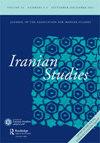“伊斯兰教说我们都是平等的”:1921 - 1925年苏联在伊朗宣传中的伊斯兰转向
IF 0.9
4区 社会学
Q2 AREA STUDIES
引用次数: 0
摘要
20世纪20年代初,苏联对伊斯兰教的兴趣在国际范围内高涨。这种兴趣在很大程度上受到大博弈逻辑的引导,当时反对英国的伊斯兰圣战思想在整个中东地区非常流行。人们普遍认为,布尔什维克的马克思主义理论排除了将宗教纳入苏联政策的任何可能性,与此相反,莫斯科的最高当局对国内外的伊斯兰教采取了相当机会主义的立场。本研究主要利用俄罗斯的档案资料,对苏联在伊朗的话语、外交和宣传中转向伊斯兰教的起源和性质提出质疑。文章的结论是,尽管苏联与一些伊朗神职人员的和解以及将宗教因素纳入共产主义宣传是出于短期地缘政治目标的考虑,但这些行动在很大程度上受到苏联国内政策和一战后地区相互依赖的制约。本文章由计算机程序翻译,如有差异,请以英文原文为准。
“Islam Says We Are All Equal”: The Islamic Turn in Soviet Propaganda in Iran, 1921–25
Abstract The early 1920s witnessed an upsurge in Soviet interest in Islam on an international scale. This interest was to a large extent guided by Great Game logic, at a time when the idea of Islamic jihad against the British was extremely popular all over the Middle East. Contrary to the common assumption that the Marxist rationale of the Bolsheviks excluded any possibility of integrating religion into Soviet policy, the highest authorities in Moscow adopted a rather opportunistic position with regard to Islam both at home and abroad. Drawing mainly on Russian archival sources, this study questions the origins and nature of the Islamic turn in Soviet discourse, diplomacy, and propaganda in Iran. The article concludes that although the Soviet rapprochement with some members of the Iranian clergy and the integration of religious elements into communist propaganda were carried out for the sake of short-term geopolitical goals, these maneuvers were much conditioned by Soviet domestic policy and post–World War I regional interdependencies.
求助全文
通过发布文献求助,成功后即可免费获取论文全文。
去求助
来源期刊

Iranian Studies
Multiple-
自引率
0.00%
发文量
92
期刊介绍:
Iranian Studies is a peer-reviewed journal devoted to Iranian and Persian history, literature, and society, published on behalf of the Association for Iranian Studies . Its scope includes all areas of the world with a Persian or Iranian legacy, especially Iran, Afghanistan, Central Asia and the Caucasus, and northern India, and Iranians in the diaspora. It welcomes submissions in all disciplines.
 求助内容:
求助内容: 应助结果提醒方式:
应助结果提醒方式:


